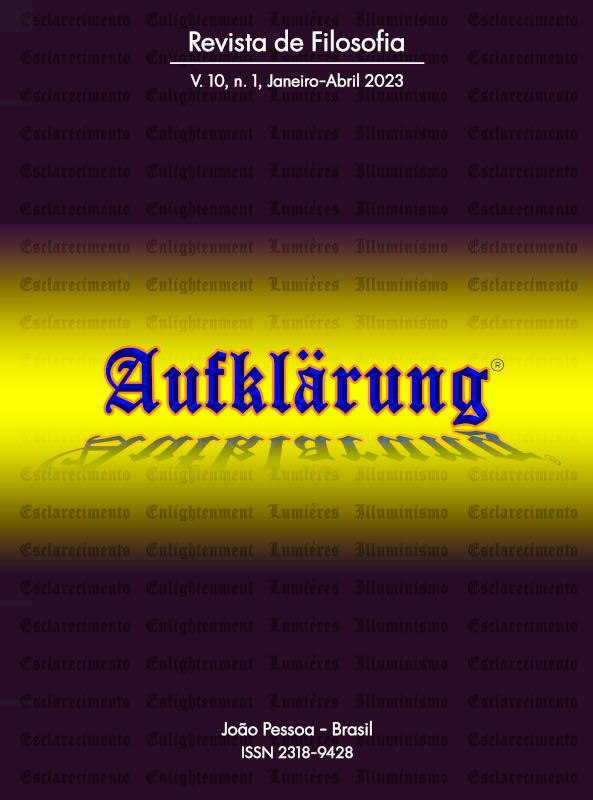The meaning of passions and emotions: Hume
DOI:
https://doi.org/10.18012/arf.v10i1.64248Keywords:
Modern History, Feelings, Perceptions, EmpiricismAbstract
This article presents a critical bibliographic review of the central characteristics of Hume's Theory of Passions and Emotions, which conceived the philosophy of human nature as an analytical and experimental science. This view is contrary to the ancient and medieval ideas that passions were movements of the lower parts of the soul. For Hume, passions in general are among the perceptions of the mind, although they also serve as motivations to act and even to reason. The apparent dichotomy that existed between passions and reason was abandoned and reason was treated as a calm passion. Hence, Hume dethroned reason from its sovereign position in knowledge. For him, passions are neither subordinate nor independent of reason; it is the reason that is subordinate to passions.
Downloads
References
COLLIER, M. Hume’s science of emotions: feeling theory without tears. Hume Studies, Charlottesville, v. 37, n. 1, p. 3-18, 2011. Disponível em: . Acesso em: 21 ago. 2022, 15:45:00.
CRANSTON, M.; JESSOP, T. E. David Hume. In: Encyclopedia Britannica. Chicago: Encyclopædia Britannica, Inc., 2021. Disponível em: . Acesso em: 21 ago. 2022, 15:45:00.
DIXON, T. From passions to emotions:the creation of a secular psychological category. Cambridge: Cambridge University Press, 2003. 287 p.
HUME, D. An enquiry concerning human understanding. In: MILLICAN, P. (Ed.). Oxford world’s classics. Oxford: Oxford University Press, 2007.
HUME, D . A treatise of human nature. In: SELBY-BIGGE, L. A. (Ed.). A treatise of human nature. Oxford: Clarendon Press, 1960.
HUME, D . A dissertation on the passions. In: BEAUCHAMP, T. L. (Ed.). A dissertation on the passions; the natural history of religion: a critical edition. Oxford: Oxford University Press, 2007.
HUME, D . Of the delicacy of taste and passion. In: MILLER, E. F. (Ed.). Essays moral, political, literary. Indianapolis: Liberty Fund, 1987.
LAING, B. M. The contemporary theory of instinct. The Monist, Oxford, v. 35, n. 1, p. 49-69, 1925.
MATOS, J. C. M. Instinto e razão na natureza humana, segundo Hume e Darwin. Scientiae Studia, São Paulo, v. 5, n. 3, p. 263-286, 2007.
MORRIS, W. E.; BROWN, C. R. David Hume. In: ZALTA, E. N. (Ed.). The Stanford encyclopedia of philosophy. Stanford: Stanford University, 2021. Disponível em: . Acesso em: 21 ago. 2022, 15:45:00.
SCHMITTER, A. M. Hume on the emotions: Supplement to 17th and 18th century theories of emotions. In: ZALTA, E. N. (Ed.). The Stanford encyclopedia of philosophy. Stanford: Stanford University, 2021. Disponível em: <17th and 18th Century Theories of Emotions > Hume on the Emotions (Stanford Encyclopedia of Philosophy)>. Acesso em: 21 ago. 2022, 15:45:00.
Additional Files
Published
How to Cite
Issue
Section
License

This work is licensed under a Creative Commons Attribution 4.0 International License.
Journal general policy
1.This journal works under a Creative Commons License aplied to online journals. That icence can be read in the following link: Creative Commons Attribution 4.0 International (CC BY 4.0).
2.Accordingly to this License, a)the journal declares that authors hold the copyright of their articles without restrictions, and they can archieve them as post-print elsewhere. b)the journal allow the author(s) to retain publishing rights without restrictions.
Metadata Policy for information describing items in the repository
1. Anyone may access the metadata free of charge at anytime.
2.The metadata may be re-used in any medium without prior permission, even commercial purposes provided the OAI Identifier or a link to the original metadata record are given, under the terms of a CC BY license refered for the Journal.







































